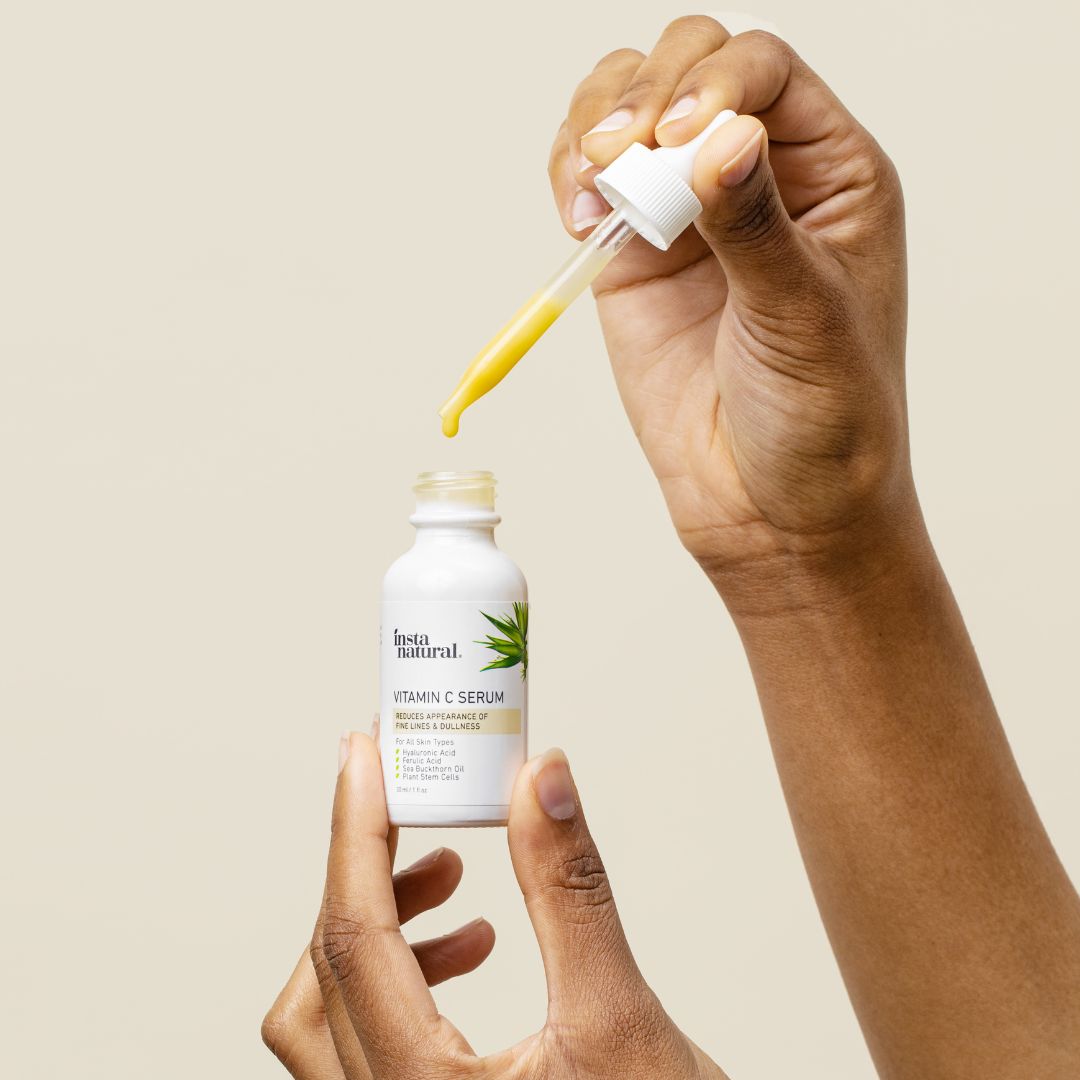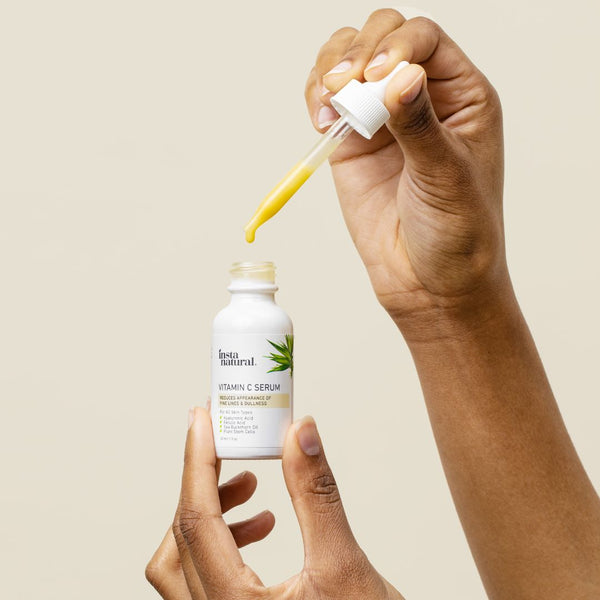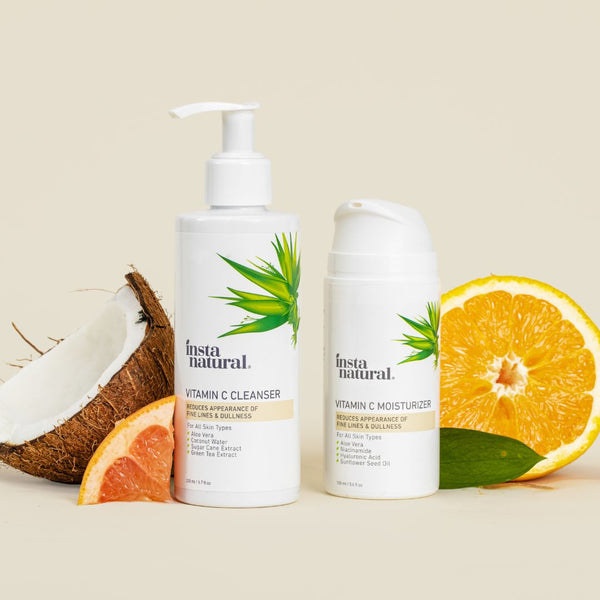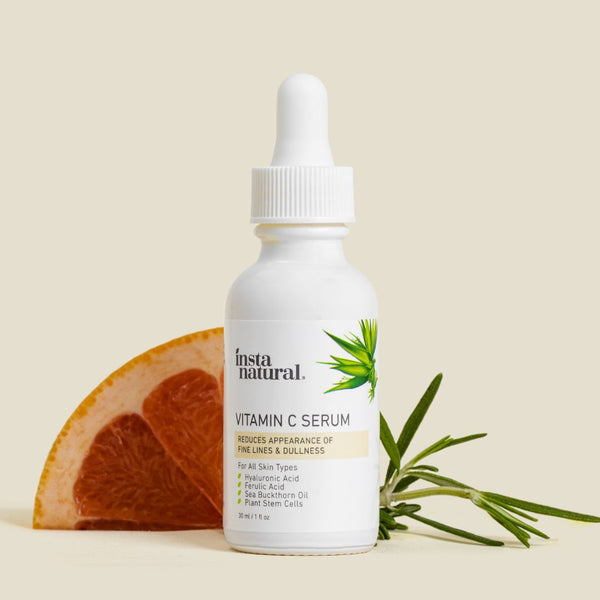There are so many benefits to adding Vitamin C into your skincare routine. This antioxidant is one of the most powerful anti-aging ingredients in skincare it's the fundamental ingredient we leverage in all of our products to improve radiance and skin health.

Vitamin C is Proven To:
- Defend against environmental aggressors
(such as UV rays!) - Strengthen the skin barrier
- Brighten discoloration
- Reduce signs of aging such as lines and wrinkles
- Support collagen production
Vitamin C Serums are one of the most popular anti-aging treatments. As a brand that has built themselves around Vitamin C, we're here to answer some of the most commonly asked questions so that by the end of this, you will know if a Vitamin C Serum is the right solution for you.
What Does Vitamin C Serum Do?
A Vitamin C Serum is a lightweight concentrated treatment that absorbs quickly and targets skin concerns such as discoloration, fine lines, wrinkles, and dullness. Vitamin C is a powerful active ingredient but depending on the form used in the Vitamin C Serum, it can cause some irritation.
The Form We Like Best: Sodium Ascorbyl Phosphate
- Stable at a higher pH resulting in a reduced risk of irritation.
- Clinical-data demonstrates it supports collagen, decreases discoloration and improves firmness.
- Clinical-data also demonstrates a reduction in the appearance
- of blemishes and post-inflammatory hyperpigmentation.
- Superior stability in water-based formulations (longer shelf life!)
Our Vitamin C Serum combines Sodium Ascorbyl Phosphate with our C Botanical Blend™, our exclusive blend of Rosemary Extract, Centella Extract, Hibiscus Extract, Hesperidin and Meadowfoam Seed Oil, all botanicals that are all naturally rich in Vitamin C. This combination gives the skin a powerful dose of Vitamin C without the risk of irritation, no matter what skin type you have.

When to Use a Vitamin C Serum?
Your Vitamin C Serum should be applied after cleansing and toning, but before your moisturizer. Applying a Vitamin C Serum in the morning will help defend against free radical exposure while instantly brightening and energizing skin tone. You can also apply your Vitamin C Serum at night or you can alternate it with Retinol for a powerful day/night routine.

How Long Does a Vitamin C Serum Take to Work?
The average skin cell renewal cycle is 30 days but this rate naturally declines as we age. We recommend a full 60 days of consistent use to see the full benefits of a Vitamin C Serum. However, within 2 weeks you can expect to see an improvement in overall radiance and skin health. Long-term results such as reduced signs of aging and brightening discoloration can take 8-12 weeks, based on your overall skin care routine and unique skin conditions.
We recommend taking a before picture at the start of using a Vitamin C Serum and compare it to your skin after 3-4 weeks of use. You’ll be surprised at the visible improvements you don’t tend to notice when looking in the mirror every day!
What are The Best Ingredients to Pair with a Vitamin C Serum?
Vitamin C Serums are a versatile product that can layer with other ingredients to enhance the results of your skincare routine.
HYALURONIC ACID
If your skin feels dehydrated and dull, combining Vitamin C and Hyaluronic Acid will deliver intense hydration while brightening skin tone. “Hyaluronic acid and Vitamin C are commonly used together because they complement each other to hydrate, protect, and repair aging skin,” says Joshua Zeichner, MD, the Director of Cosmetic and Clinical Research at Mount Sinai Hospital’s Department of Dermatology.
- TIP! Our Vitamin C Serum includes Hyaluronic Acid because we find most people can benefit from additional hydration! If you're looking for more hydration, you can layer or alternative with a Hyaluronic Acid Serum.
NIACINAMIDE
Niacinamide is a form of Vitamin B3 and is loved for it’s ability to soothe the skin while reducing redness and discoloration. When combined with Vitamin C, you will see additional brightening and skin strengthening benefits without the worry of irritation. If your skin is sensitive, this is the perfect pair for you!
- TIP! Often times, it is recommended to avoid combining Niacinamide and Vitamin C, but this isn't always necessary. This recommendation is mostly associated with combining Vitamin C in the form of Ascorbic Acid with Niacinamide, as the pH levels can be incompatible. However, there are many derivates - such as Sodium Ascorbyl Phosphate - which work well with Niacinamide!
AZELAIC ACID
Despite both being strong actives, Azelaic Acid is safe to combine with Vitamin C. When used together they will reduce breakouts, blemishes, and discoloration for an overall improvement in skin clarity. We combine both in our Azelaic Acid Moisturizer by using a form of Vitamin C called Ascorbyl Glucoside. We intentionally choose this derivative because it is most compatible with Azelaic Acid and ensures stability and efficacy in this formula. Additionally, this derivative has a time-released effect for continual absorption which reduces irritation risk and it's excellent for scarring.
- TIP! Azelaic Acid is amazing for those that struggle with rosacea or acne-rosacea.
When using a Vitamin C Serum with Azelaic Acid, you may want to begin by using the Vitamin C Serum in the morning and the Azelaic Acid product at night. This allows a slow introduction to your skin and gives you the opportunity to monitor for any signs of irritation. Once your skin is accustomed to both ingredients, they are safe to use in the same skincare routine.
What Ingredients Should You Avoid When Using Vitamin C Serum?
It can be confusing to understand what ingredients shouldn’t be used with Vitamin C and a Vitamin C Serum. Let’s talk about the two most common ingredients we get asked about.
RETINOL
The concern around mixing Retinol and Vitamin C is due to the incompatibility of Ascorbic Acid with Retinol, as Ascorbic Acid requires a much lower pH than Retinol. If combined in the same formula, not only would the Retinol become ineffective, but the Vitamin C could also begin to oxidize.
- What about layering? Valid question! There is conflicting perspectives on if layering Retinol with Ascorbic Acid renders one ineffective. However what we have found is that layering these 2 ingredients can pose a risk of irritation, which isn't worth it to us!
Instead of Ascorbic Acid, we a derivative of Vitamin C called Sodium Ascorbyl Phosphate (the form we mentioned earlier). This derivative on its own is far more stable and less irritating than Ascorbic Acid. Additionally, it is stable at a higher pH range, which means it can be safely and effectively combined with Retinol!
GLYCOLIC ACID

There can also be some confusion with mixing Glycolic Acid, an alpha-hydroxy acid (AHA), with Vitamin C because they are both potent actives. To clear any doubts, it is safe to combine the two in your skincare routine! The most important thing to be mindful of is how your skin responds to the combination. If you tend to experience sensitivity, we recommend introducing the ingredients into your routine by alternating them and as your skin becomes accustomed to the ingredients, you can slowly start layering. If at any point you experience irritation, simply go back to alternating!
The Vitamin C derivative we use in our Glycolic Acid products is Tetrahexyldecyl Ascorbate which is an oil-soluble form that is stable at a lower pHs and can be safely formulated with other acids such as Glycolic Acid.
- TIP! You can use a Glycolic Cleanser or Glycolic Toner to gently exfoliate and follow with a Vitamin C Serum to strengthen the skin barrier and brighten discoloration.
Can I Use a Vitamin C Serum After Chemical Peel?
A chemical peel is a robust treatment that deeply exfoliates the skin so we would recommend following the peel only with a gentle moisturizer to prevent irritation and to allow the skin barrier an opportunity to recover. You should only have to take this precaution directly after the peel (which we recommend you do at night!)
Is Vitamin C Serum Safe During Pregnancy?
There are many things you have to avoid when you are pregnant however, a Vitamin C Serum is not one of them. It is completely safe to use in your skincare routine while pregnant as it will defend the skin against environmental stressors and it may help prevent pregnancy related melasma. Rachel Nazarian, MD, FAAD, a board-certified dermatologist says "Vitamin C is a great and safe ingredient to use while pregnant. Thankfully, it’s a super safe ingredient, and works well with other products in most basic skincare regimens, such as sunscreen.”
Your skin may encounter new concerns throughout pregnancy, linked to hormonal fluctuations and other related conditions, therefore, you should always consult with your doctors prior to using any products during this period.
Explore Our Vitamin C Products

Since 2013 we've been the leader in creating natural Vitamin C skincare and we believe that Vitamin C deserves a spot in everyone's skin care routine. Check out our best selling Vitamin C Serum and our full Vitamin C Collection which includes a product for every skin type and concern!



